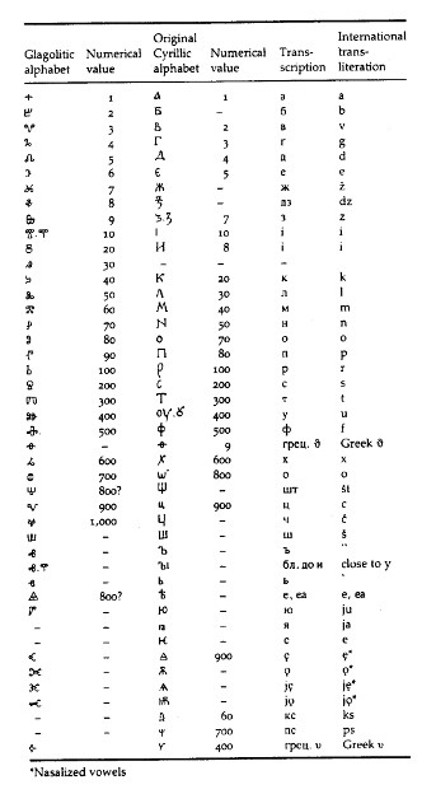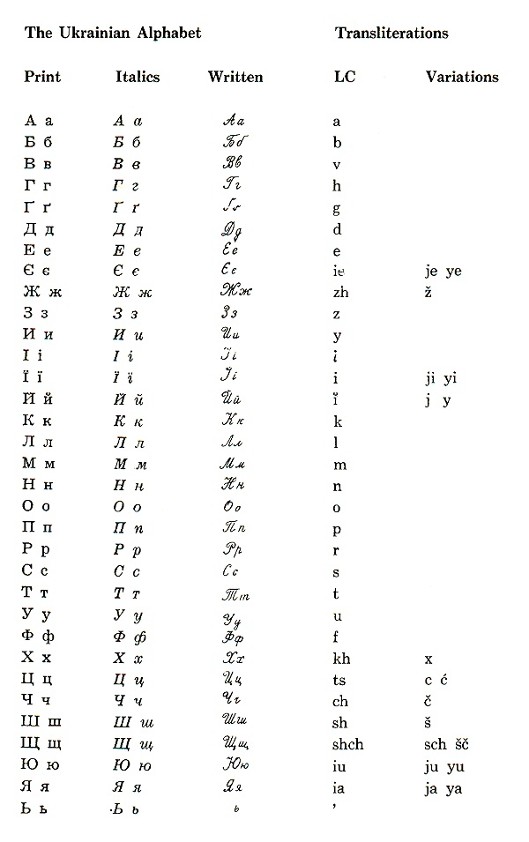Cyrillic alphabet
Cyrillic alphabet (????????; kyrylytsia). Slavic system based on the Greek majuscule script (ustav, uncial letters) (see Ustav script). The Balkan Slavs may initially have used the Greek alphabet for the occasional notation of a Slavic name or an individual word. When, after their expulsion from Moravia in 885, the disciples of Saint Cyril and Saint Methodius settled in Bulgaria, they had recourse to the Greek alphabet as a replacement for the Glagolitic alphabet developed by Saint Cyril. The Greek alphabet was adapted to Slavic and supplemented by letters from the Glagolitic that rendered phonemes lacking in the Greek language. The original center of the Cyrillic alphabet was probably Preslav, Bulgaria. This synthesis of Greek and Glagolitic was named the Cyrillic alphabet in honor of the creator of the first Slavic alphabet. The original Cyrillic alphabet had 36 to 38 letters (the sounds u and y were rendered by the diphthongs oy and ?), some of which were used only, or primarily, in the writing of Greek words ( ,
,  ,
,  ,
,  ,
,  ). Most of the letters also had a numerical value (see chart). With the expansion of eastern Christianity, the Cyrillic alphabet spread from Bulgaria to other Slavic lands. The Cyrillic alphabet (with certain modifications, the most radical of which was the introduction of the Hrazhdanka script) is still used today in the Ukrainian, Russian, Belarusian, Bulgarian, Macedonian, and Serbian writing systems. Modern Ukrainian alphabet has eliminated the letters
). Most of the letters also had a numerical value (see chart). With the expansion of eastern Christianity, the Cyrillic alphabet spread from Bulgaria to other Slavic lands. The Cyrillic alphabet (with certain modifications, the most radical of which was the introduction of the Hrazhdanka script) is still used today in the Ukrainian, Russian, Belarusian, Bulgarian, Macedonian, and Serbian writing systems. Modern Ukrainian alphabet has eliminated the letters  ,
,  ,
,  ,
,  ,
,  ,
,  ,
,  ,
,  ,
,  ,
,  ,
,  from the original alphabet; introduced the new letters ?, e, ? (Meletii Smotrytsky), � (Panas Rudchenko, Yevhen Zhelekhivsky); and changed the sound value of the letters ? (=h, not g), ? =je, not ?), ? (=y, not i), ? (=�?, not �t), ? (=soft sign, not the short front vowel).
from the original alphabet; introduced the new letters ?, e, ? (Meletii Smotrytsky), � (Panas Rudchenko, Yevhen Zhelekhivsky); and changed the sound value of the letters ? (=h, not g), ? =je, not ?), ? (=y, not i), ? (=�?, not �t), ? (=soft sign, not the short front vowel).
BIBLIOGRAPHY
Durnovo, N. �Mysli i predpolozheniia o proiskhozhdenii staroslavianskogo iazyka i slavianskikh alfavitov,� Byzantinoslavica, 1923, no. 1.
Karskii, E. Slavianskaia kirillovskaia paleografiia (Leningrad 1928; repr Leipzig 1973)
Il'inskii, G. �Gde, kogda i s kakoi tsel'iu glagolitsa byla zamenena "kirillitsei"?,� Byzantinoslavica, 1931, no. 3
Ohiienko, I. Postannia azbuky i literaturno� movy u slov'ian (Zhovkva 1937)
Horodyski, B. Podrecznik paleografii ruskiej (Cracow 1951)
Trubetzkoy, N. Altkirchenslavische Grammatik (Vienna 1954)
Vaillant, A. �L'alphabet vieux-slave,� Revue des �tudes slaves, 32 (1955)
AN URSR, Sektsiia suspil'nykh nauk. Pytannia pokhdzhennia i rozvytku slov'ians'ko� pysemnosti (Kyiv 1963)
George Yurii Shevelov
[This article originally appeared in the Encyclopedia of #Ukraine, vol. 1 (1984).]

